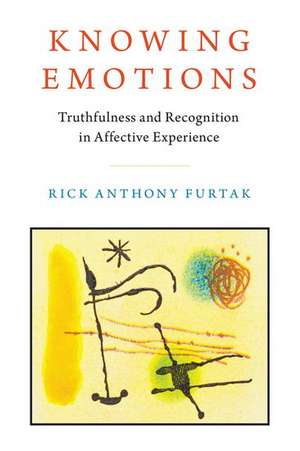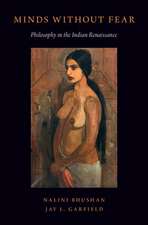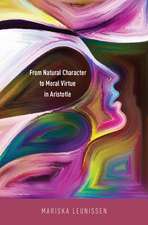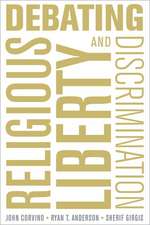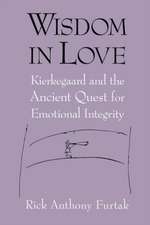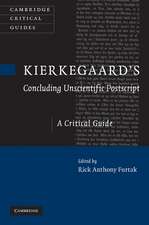Knowing Emotions: Truthfulness and Recognition in Affective Experience
Autor Rick Anthony Furtaken Limba Engleză Paperback – 31 ian 2020
| Toate formatele și edițiile | Preț | Express |
|---|---|---|
| Paperback (1) | 277.02 lei 31-37 zile | |
| Oxford University Press – 31 ian 2020 | 277.02 lei 31-37 zile | |
| Hardback (1) | 531.70 lei 31-37 zile | |
| Oxford University Press – 5 apr 2018 | 531.70 lei 31-37 zile |
Preț: 277.02 lei
Preț vechi: 304.08 lei
-9% Nou
Puncte Express: 416
Preț estimativ în valută:
53.01€ • 55.01$ • 44.31£
53.01€ • 55.01$ • 44.31£
Carte tipărită la comandă
Livrare economică 05-11 martie
Preluare comenzi: 021 569.72.76
Specificații
ISBN-13: 9780190099794
ISBN-10: 0190099798
Pagini: 248
Dimensiuni: 137 x 208 x 15 mm
Greutate: 0.25 kg
Editura: Oxford University Press
Colecția OUP USA
Locul publicării:New York, United States
ISBN-10: 0190099798
Pagini: 248
Dimensiuni: 137 x 208 x 15 mm
Greutate: 0.25 kg
Editura: Oxford University Press
Colecția OUP USA
Locul publicării:New York, United States
Recenzii
In laying the foundations for his own argument, Furtak provides an excellent overview of the dominant theories of emotion and how they have been taken up by philosophers without reflection on the ongoing developments in psychology and neurobiology.
In Knowing Emotions, Furtak provides a compelling argument that our emotions are the source of invaluable and irreplaceable truth about ourselves and what truly matters to us.
This book is a clear and engaging account of the many ways in which our emotional responses can light up the significance of the world. Furtak's beautifully crafted discussion exhibits the analytical precision of serious philosophical writing, but also, in its handling of literary examples, the interpersonal sensitivity that is required for a rounded appreciation of the contribution of the emotions to the well-lived human life.
With compelling arguments, command of the latest scientific research, and an impressive depth of human insight, Rick Furtak's Knowing Emotions makes a most welcome addition to the philosophical literature on emotions. Furtak departs from other defenses of a cognitive conception of emotions by emphasizing the intelligent, world-revealing nature of the living body. He argues convincingly that our embodied emotional responses enable us to perceive features of the world that would otherwise remain unknown to us. Elegantly and clearly written, this book is valuable not only to professional philosophers but also to anyone seeking deeper human understanding.
Rick Furtak's excellent book offers a plausible and attractive view of the nature of the emotions. Writing against the widespread tendency to see emotions as illogical (or alogical) brute psychological occurrences, Furtak reminds us that 'our emotions have a reasonableness or 'logic' of their own.' He is especially skillful when criticizing the hasty and overambitious conclusions frequently drawn from empirical research into the emotions and exposing the unjustified assumptions that are so often smuggled into the interpretations of such research. All in all, this is an enlightening, persuasive, and, I think, important book. Readers who are currently skeptical about the idea that emotions aim at truth may well have their minds changed, while those who are already sympathetic to the basic idea may find their understandings deepened and enriched by Furtak's careful and insightful argumentation.
In this original and thoroughly engaging book, Rick Furtak argues that emotions consist in a distinctive kind of bodily cognition, which reveals truths about the world and other people that would otherwise be inaccessible to us. His discussion is clear and compelling throughout, providing important new insights into the relationships between emotion, feeling, evaluation, belief, and interpersonal experience. The book should be essential reading not just for philosophers but for anyone working on emotion.
Furtak offers readers an inviting view of the nature of emotions and the role they play in human existence as conduits to truth. ... The language of this book is clear and free of jargon and should provide an excellent guide to emotions as they are actually lived for a wide range of interested readers, from beginning students and seasoned academics to those in the healing professions.
For much of [Furtak's book] I found myself nodding in agreement. ... Furtak has set out to explain how the 'somatic agitation we feel when we are affectively moved might actually contribute to the way that the emotions inform us about how things are going in our world of concern.' It is a worthy goal.
In Knowing Emotions, Furtak provides a compelling argument that our emotions are the source of invaluable and irreplaceable truth about ourselves and what truly matters to us.
This book is a clear and engaging account of the many ways in which our emotional responses can light up the significance of the world. Furtak's beautifully crafted discussion exhibits the analytical precision of serious philosophical writing, but also, in its handling of literary examples, the interpersonal sensitivity that is required for a rounded appreciation of the contribution of the emotions to the well-lived human life.
With compelling arguments, command of the latest scientific research, and an impressive depth of human insight, Rick Furtak's Knowing Emotions makes a most welcome addition to the philosophical literature on emotions. Furtak departs from other defenses of a cognitive conception of emotions by emphasizing the intelligent, world-revealing nature of the living body. He argues convincingly that our embodied emotional responses enable us to perceive features of the world that would otherwise remain unknown to us. Elegantly and clearly written, this book is valuable not only to professional philosophers but also to anyone seeking deeper human understanding.
Rick Furtak's excellent book offers a plausible and attractive view of the nature of the emotions. Writing against the widespread tendency to see emotions as illogical (or alogical) brute psychological occurrences, Furtak reminds us that 'our emotions have a reasonableness or 'logic' of their own.' He is especially skillful when criticizing the hasty and overambitious conclusions frequently drawn from empirical research into the emotions and exposing the unjustified assumptions that are so often smuggled into the interpretations of such research. All in all, this is an enlightening, persuasive, and, I think, important book. Readers who are currently skeptical about the idea that emotions aim at truth may well have their minds changed, while those who are already sympathetic to the basic idea may find their understandings deepened and enriched by Furtak's careful and insightful argumentation.
In this original and thoroughly engaging book, Rick Furtak argues that emotions consist in a distinctive kind of bodily cognition, which reveals truths about the world and other people that would otherwise be inaccessible to us. His discussion is clear and compelling throughout, providing important new insights into the relationships between emotion, feeling, evaluation, belief, and interpersonal experience. The book should be essential reading not just for philosophers but for anyone working on emotion.
Furtak offers readers an inviting view of the nature of emotions and the role they play in human existence as conduits to truth. ... The language of this book is clear and free of jargon and should provide an excellent guide to emotions as they are actually lived for a wide range of interested readers, from beginning students and seasoned academics to those in the healing professions.
For much of [Furtak's book] I found myself nodding in agreement. ... Furtak has set out to explain how the 'somatic agitation we feel when we are affectively moved might actually contribute to the way that the emotions inform us about how things are going in our world of concern.' It is a worthy goal.
Notă biografică
Rick Anthony Furtak is Associate Professor of Philosophy at Colorado College, where he has taught for over twelve years. His research focuses on philosophy of emotions and existential thought. He is also a poet and translator.
